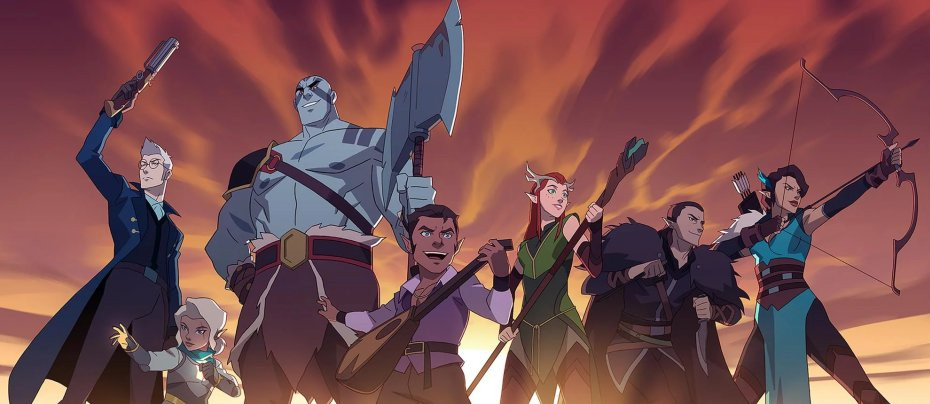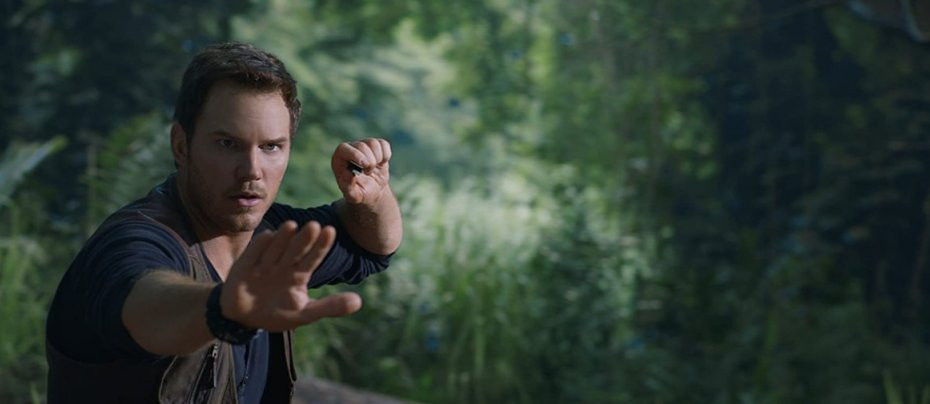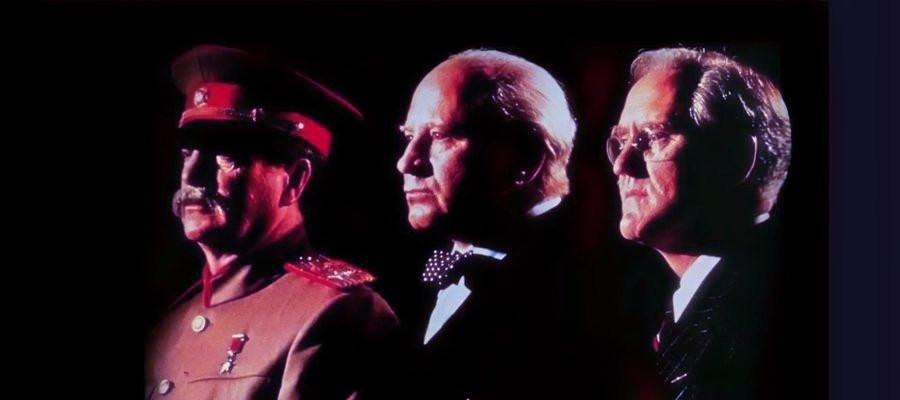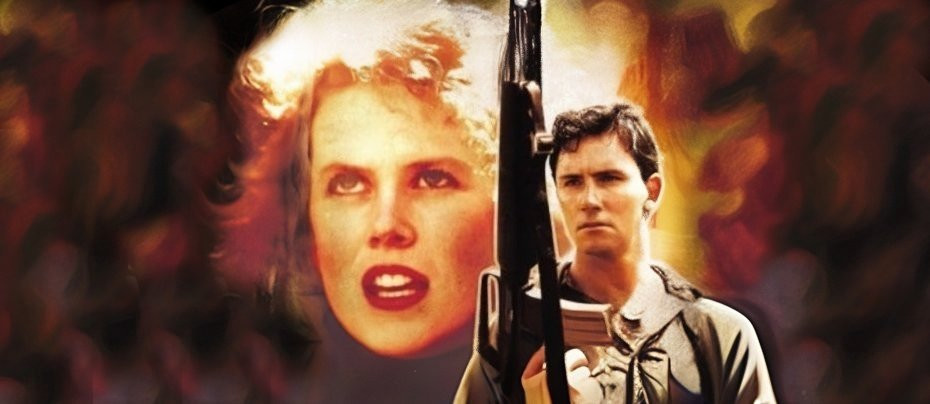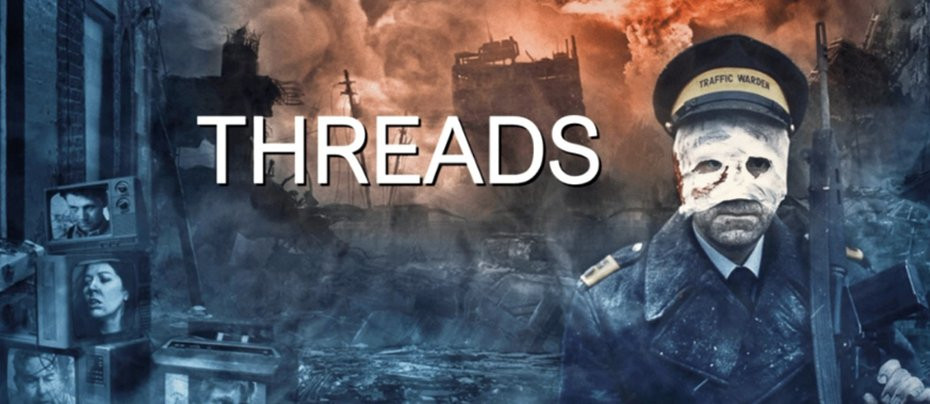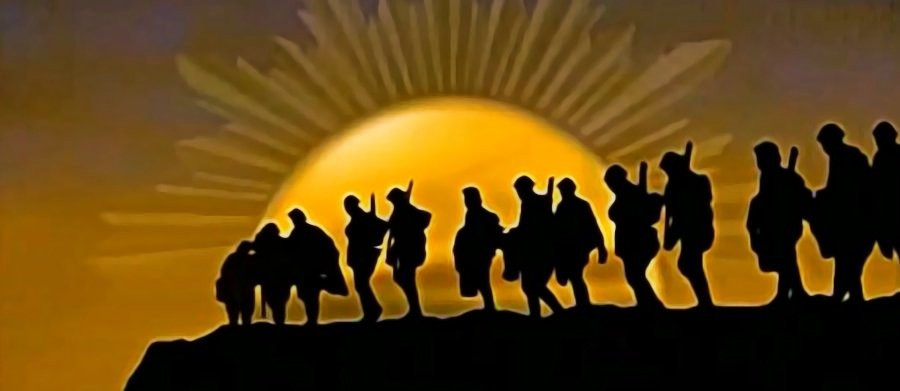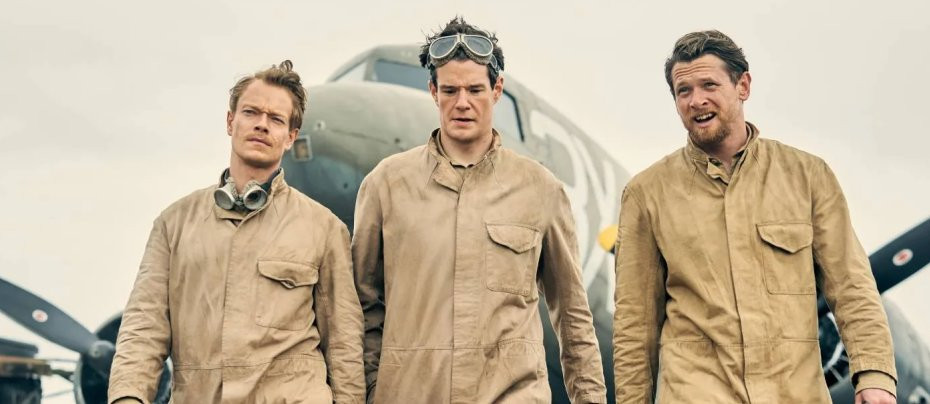
SAS Rogue Heroes
2022 - United Kingdom“Even when the events are relatively accurate the characters lack all authenticity.”
SAS Rogue Heroes review by John Winterson Richards
Steven Knight's great challenge when writing Peaky Blinders was to make life in Interwar Birmingham look a lot more exciting than it really was. SAS Rogue Heroes presented him with the opposite problem: it was necessary to tone down the facts a bit to make them seem more realistic. This happens quite a lot in historical drama.
Each episode begins with an odd disclaimer: "Based on a true story. Those events depicted which seem most unbelievable... are mostly true."
If this reads like someone trying a bit too hard to be clever, it is in fact a fairly accurate summary of the script's attitude to the real history of the early days of the Special Air Service (SAS) in North Africa, 1941-43. It does not claim to be all true, but the most incredible bits are at least based on truth.

Lieutenant David Stirling bluffing his way into and through GHQ Middle East to talk to the Commander in Chief? Yes, that happened. The truly disastrous first mission? Yes, that happened. The amazingly successful subsequent raids on Axis airfields? Yes, they happened. Stealing much of their supplies and equipment from their own side, including a piano from the New Zealand Division? Yes, that happened. The Prime Minister's son, Randolph Churchill, hitching a lift with the SAS as they raided Benghazi? Yes, that happened, if not quite as shown. The SAS being joined by hardened Free French paratroopers? Yes, that happened. German speaking infiltrators in German uniforms helping the raiders through enemy lines? Yes, that happened. Stirling asking for the autographs of the Prime Minister, Winston Churchill, and the Commander in Chief, Sir Claude Auchinleck, only to use them at the bottom of a forged 'carte blanche'? Yes, that happened. The stylised drive along a German airstrip with all guns blazing? Yes, that really did happen and much as depicted, except not on the occasion shown.
All this, and a great deal more referenced in SAS Rogue Heroes, honestly happened in real life, if not always in the way it is presented or in the same order. This is not surprising given that the drama is based on a history of the early SAS written by Ben Macintyre, a journalist and historian with a much greater respect for truth than many in both those professions these days. Macintyre also presented a first-class documentary series, based on his book, with the slightly different title - helpful in retrospect now that we have the drama series too - 'SAS Rogue Warriors.' The documentary is actually more compelling than the drama.

Many changes were necessary in the process of dramatisation, particularly in terms of scale and simplification. The raid on Benghazi and "Operation Agreement" - of which only part is mentioned in SAS Rogue Heroes - were complicated affairs involving more men and resources than could be accommodated by a television budget. Similarly, the German speaking infiltrators were not from the Free French Squadron of the SAS as the show suggests but from the Special Interrogation Group (SIG) recruited largely from among Jews in the British Mandate of Palestine: now the SIG has its own fascinating story, worthy of a drama in its own right, but since SAS Rogue Heroes is about the SAS one can understand why Knight chose not to confuse the viewer. Stirling and the SAS are therefore more central to the drama than they were to the War. Such decisions are a natural part of the adaptation process and entirely excusable.
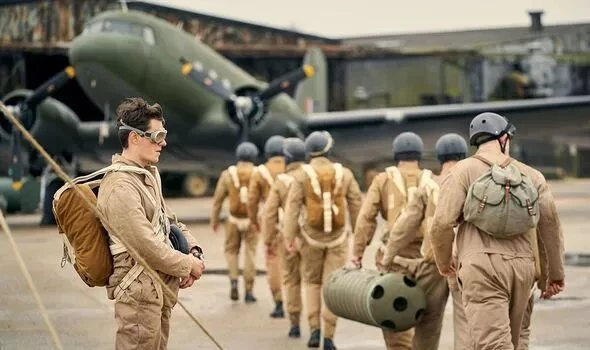
Nevertheless, more might have been done to put it all in context. The SAS and SIG were in fact only two among many Special Operations organisations put together in World War Two forming a "family tree" that stretches down to the Special Forces of the United Kingdom, France, Belgium, Australia, and Israel, among others, as they exist today. After Britain's almost miraculous survival in 1940, British military planners faced a problem: they might be able to defend themselves, but how were they going to attack the Germans and beat them? There seemed no prospect of doing so after being driven out of France and losing all their allies. Churchill, for sound political reasons, still wanted to be seen to be taking the offensive, while his professional advisers, for sound military reasons, wanted to conserve and concentrate their forces at decisive points. Into the gap between these conflicting objectives stepped a number of adventurous characters, of whom Stirling was only one, with schemes to hit the enemy hard with limited resources. Over the course of the War a number of small secret armies were formed outside the regular chain of command, including the Commandos (who trained Stirling), the Special Operations Executive (who worked with the Resistance), the Long Range Desert Group (LRDG), the Long Range Penetration Group (Orde Wingate's "Chindits"), No 1 Demolition Squadron PPA ("Popski's Private Army"), GHQ Liaison Regiment ("Phantom"), 30 Assault Unit (established by James Bond author Ian Fleming), V Force, the Levant Schooner Flotilla, the SIG, and, of course, the SAS and its offspring, the Special Boat Section (SBS). Note that the name of Colonel Dudley Clarke tends to crop up a lot in connection with organisations in this "family tree."
Reading the history of these organisations, one is struck by how much those war films of the 1960s, especially those set in the Mediterranean Theatre, such as 'The Guns of Navarone,' 'Tobruk,' and 'Play Dirty,' have at least some basis in historical fact. Indeed, it is perhaps fairer to compare SAS Rogue Heroes with such films than with strict history. The show itself seems to invite comparison by beginning with a jaunty theme that obviously references Ron Goodwin's score for 'Where Eagles Dare' and Elmer Bernstein's for 'The Great Escape.'
However, it is precisely in making this comparison that the essential weakness of SAS Rogue Heroes is revealed. Those films were made to a great extent by and for people who had fought in the War. When you watch, say, David Niven and Anthony Quayle in 'The Guns of Navarone' you are watching not only actors but also Major Niven who commanded a Squadron in 'Phantom' and Major Quayle who was a Liaison Officer with Albanian Partisans (neither liked to talk about their experiences, but Quayle wrote a superb novel in an attempt to exorcise his demons by fictionalising them). Their characters feel authentic because they are authentic.

By contrast, watching SAS Rogue Heroes one never forgets for an instant that one is watching 21st Century actors pretending to be what they are not. There has been a definite generational shift as memories are lost. Even when the events are relatively accurate the characters lack all authenticity.
People were different in the 1940s. They looked, talked, and thought differently. Listen to them whenever you get the opportunity - sadly there are few opportunities to do so now, but your reviewer always made the most of them when he was younger. They really were more matter of fact in the old days. Listen to the recorded interviews of those no longer with us. Look at the photographs of the Wartime generation, especially the soldiers in the field. Although most were fairly young, nearly all in their twenties in the original SAS, they exude a maturity lacking in the equivalent age group today - perhaps because they did not try to hold on to their youth indefinitely as people tend to do these days, perhaps because they were aged before their time by their experiences.
Given that Knight's Peaky Blinders was so successful in making its protagonists look and sound like credible working-class hard men of their period, it is surprising how little effort went into getting the appearance and manner of the characters right in SAS Rogue Heroes. The hair is particularly irritating - there is simply too much of it for the time and place. Then there is the fact that everyone seems so well fed: quite apart from universal rationing, Commandos like Stirling, Mayne, and Lewes were trained specifically to survive for long periods on very little - training that was to come in very useful in the SAS.
Worst of all is the way they strut around like arrogant rock stars, complete with anachronistic modern soundtrack, egotistical and uncaring but at the same time showing off to some invisible camera all the time. Even self-confident eccentrics like Stirling did not act like that in the British Army in the 1940s. There were quite a few rambunctious aristocrats who shared Stirling's taste for drinking, gambling, high jinks, and what Stirling called "rogering," but they never forgot that they were part of a rigid social and military hierarchy, and their authority and prospects depended on that hierarchy - so they bought in to its assumptions, and in return it could be quite tolerant of their eccentricity.

Robert Blair "Paddy" Mayne also understood that. He was born into the Protestant gentry in County Down, the most Anglicised part of Ulster. Before the War he had graduated from University, qualified as a Solicitor, and been capped by both Ireland and the Lions at lock. Yet SAS Rogue Heroes reduces him to a cliched working class Irish wild man as part of a cliched double act with Stirling who is painted as a cliched Bullingdonesque toff. There is a lot of awkwardly unrealistic dialogue about class. It is curious that 21st Century British scriptwriters are more obsessed with the subject than their equivalents back when the class system actually meant something. Despite that they seem to have little understanding of how it operated.

There was a clear demarcation between Officers and Other Ranks, even in the relatively - emphasis on that "relatively" - democratic SAS. Most people were more guarded about emotional display in those days, and above all an Officer had to be seen to be in control of himself in front of his men. While there was, of course, quite a bit of swearing in the Armed Forces, it was not as constant as today and Officers were trained to keep cool under pressure in front of their subordinates. Yet SAS Rogue Heroes has them shouting and emoting all over the place
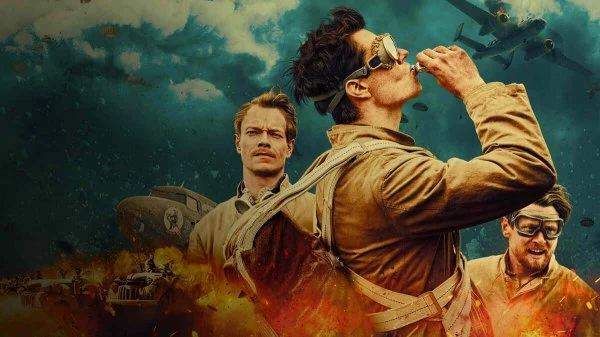
...and drinking. The famous mercenary Colonel Mike Hoare wrote that no one ever followed a drunk anywhere except into a bar. Stirling and Mayne were both good at getting others to follow them, which they could not have done had they not been calm and collected on missions. While it seems that Stirling enjoyed a drink as part of a playboy lifestyle when on leave, and Mayne could on occasion get aggressively drunk, they won the respect of their men through their professionalism in the field. The early SAS was not a booze cruise as it is implied here. Quite apart from anything else, alcohol dehydrates, and they were well aware of the need for tight water discipline on desert journeys when temperatures were over a hundred degrees Fahrenheit in the shade - of which there was little.

Most jarring of all is the disrespect shown to Jock Lewes, considered by many, including Stirling himself, as the man most responsible for giving the SAS the ethos that endures today. Although he was considered "a bit Regimental" by the standards of the SAS, he was also a great innovator: by trial and error in his lunch breaks he developed the "Lewes bombs" which destroyed dozens of German aircraft on the ground. By all accounts a likeable man and a natural leader who might have become Prime Minister had he lived, he is presented by the script as something of a pompous egomaniac. This is simply wrong.
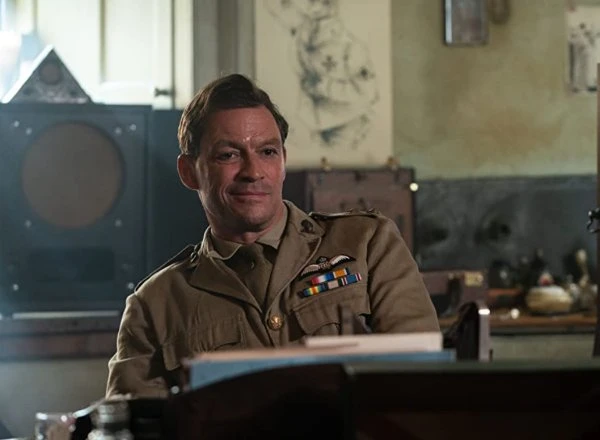
Colonel Dudley Clarke is also the victim of a hatchet job. Yes, he did have a taste for amateur dramatics that once led to him being arrested dressed as a woman on an undercover mission, but there is no evidence that he made a habit of it. He was a very serious professional officer, the British Army's acknowledged expert in military deception, and he would not have been as influential as he was had he not been generally respected as such.
No blame attaches to the actors who play these characters: Connor Swindells as Stirling, Jack O'Connell as Mayne, Alfie Allen (Game of Thrones) as Lewes, and the ever watchable Dominic West (The Wire) as Clarke all do a fine job within the parameters laid down by the script - but the script forgets that, unlike the characters in Peaky Blinders, these are real people who fought, and in one case died, for their country.

Jason Watkins and Ian Davies have good cameos as Churchills Senior and Junior. Sofia Boutella is appropriately sultry a fictional spy who is promoted to become Free French Chief of Intelligence in Cairo - because 2022 - in order to disguise the fact that her character serves no purpose other than to illustrate Stirling's interest in "rogering." In reality, although there were very effective female agents in World War Two, such a promotion would have been most unlikely, especially in the extremely traditionalist French military. It should also be noted that, although the Free French fought alongside the SAS very effectively, the British were always wary of sharing Intelligence with de Gaulle and his people.
Such errors are doubly annoying because the production has obviously gone to a lot of trouble to get details right - like the wings on Clarke's uniform: he was indeed a qualified pilot. Most of the equipment on display passed muster with someone who spent too much time making Airfix models as a child and watching 'Combat Dealers' as an alleged adult - even if there are exceptions, like the horribly anachronistic tank at the end and some of the German aircraft seen briefly before being blown up. One suspects that many of the props and set dressings were borrowed from museums. This makes it all the more irritating when one hears elementary mistakes in the dialogue such a references to "Middle East Division" and "the Distinguished Service Order medal." Did someone actually describe Other Ranks as "Enlisted Men"? Your reviewer must have misheard: no British Officer of that time would use that American expression.
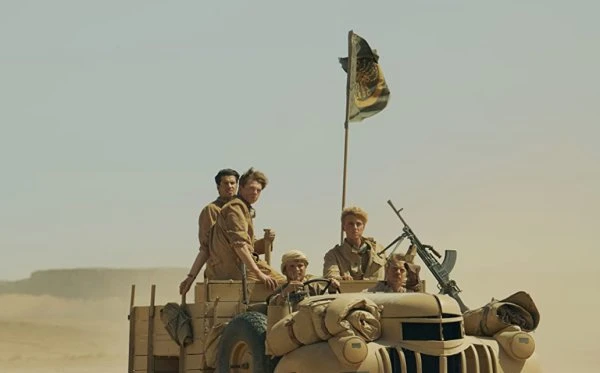
Of course, most viewers care little about the history and will want to know only how it rates as entertainment. As such, Knight delivers again. SAS Rogue Heroes is good fun in the tradition of 1970s British war comics. The action scenes are exciting and the set pieces spectacular, especially in the final episode which gives a sort of edited highlights reel of "Operation Agreement." The production values are extremely impressive for a television budget. Although they are at different ends of the Sahara, Morocco is actually a more photogenic location than Libya where the events took place, so everything somehow looks more like it should than what fact suggests. Again, this happens a lot in historical drama.
If SAS Rogue Heroes was a purely fictional adventure show, it would be judged an undoubted success. However, since it is trading in the names of the SAS and its real life heroes, it must be held to a higher standard. That disclaimer in the beginning is perhaps an acknowledgement that Knight himself realised that the fictional elements detracted from the dramatic impact of knowing that the most astonishing elements are substantially true. In the end, however, the great weakness of SAS Rogue Heroes is not inaccuracy but inauthenticity.
It is by no means a bad show - on the contrary it is a hugely enjoyable show in many ways - but it is not the great show it could have been, given the raw material, and one cannot help feeling that Stirling, Mayne, Lewes, Clarke, and Co all deserved better.
Seen this show? How do you rate it?
Seen this show? How do you rate it?
Published on November 16th, 2022. Written by John Winterson Richards for Television Heaven.


